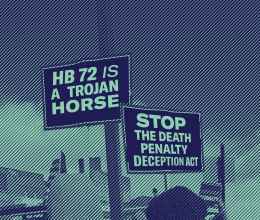If you have social media and a way to get the latest news, chances are you have heard of two abortion bans (SB 23 and HB 413) - one of which was signed into law while the other was introduced to the Ohio Statehouse this year. HB 413 is still being talked about all around the globe after all.
However, what you may not know is that there were actually NINE – not two – anti-choice/anti-abortion/anti-reproductive rights bills introduced in 2019 alone in Ohio.
And these bills weren’t the only drama Ohioans saw in terms of reproductive rights.
From an extremely restrictive six-week abortion ban being signed into law (and then temporarily blocked in the courts) to Planned Parenthood clinics being closed and yet another total abortion ban being introduced in the statehouse, following the trajectory of reproductive rights in Ohio is like getting whiplash over… and over… and over – even though abortion is STILL legal in Ohio even after all that's been said and done.
Due to this, we here at the ACLU of Ohio have decided to compile a timeline of all the shenanigans that have happened this year so that you may be better informed for 2020.
Before we peruse the outline, however, let’s do a quick 101 session to define the nine bills.*
- Senate Bill 23 – The “six-week abortion ban”. This bill bans abortions of any “unborn human individual” whose fetal heartbeat has been detected, essentially limiting abortions to six-weeks, a period of time in which most women aren’t even aware that they are pregnant.
- Senate Bill 27 – The “fetal and embryonic tissue disposal restrictions” bill – a bill which requires all fetal remains from an abortion be disposed of by either cremation or burial, thus making it extremely difficult for abortion clinics to conduct business due to time, energy, and resources being used for disposal.
- Senate Bill 155 – The “abortion pill reversal bill”. This bill requires the Department of Health release materials that should explicitly state there is a possibility to reverse the effects of an abortion conducted through the drug mifepristone – something that is not a scientific fact and could be highly dangerous for the individual taking mifepristone. Physicians are also obligated to provide these materials to all patients.
- Senate Bill 208 – “The born alive bill (extended)” – not to be confused with the born alive bill passed by the Bush Administration, this one was specifically introduced to expand the crime of abortion manslaughter to include the failure to take measures to preserve the health of a child born alive after abortion – thus making criminals out of doctors providing services.
- House Bill 90 – The “pregnancy misinformation act” – it requires the Department of Health to provide information about the humanity of an unborn child and achieving an abortion-free society.
- House Bill 182 – The “total insurance ban” bill prohibits insurance companies from providing coverage for nontherapeutic abortions. Nontherapeutic meaning that the mother’s life is not in danger. The sponsor of this bill also wants to forbid insurance companies from providing coverage for all “drugs or devices used to prevent the implantation of a fertilized ovum” – meaning all methods of birth control.
- House Bill 68 – The “six-week abortion ban II”, for it’s essentially a clone of SB 23, because it prohibits a person from preforming an abortion with the intent of the termination of the life of an unborn human individual whose fetal heartbeat has been detected.
- House Bill 297 – The “tax credits for donations to fake women’s health centers” bill. This bill allows organizations such as crisis pregnancy centers, whose whole purpose is to coerce women into not aborting their fetuses, to receive a refundable income tax credit.
- House Bill 413 – The “total abortion ban”. The global-attention grabbing of the nine, this bill, which claims life begins at conception, is a total ban on abortion, with additional regulations forcing doctors to re-implant ectopic pregnancies and punishments for doctors and individuals seeking abortions.
Now here’s the 2019 timeline of these bills:
February 12: Six-week abortion bans and fetal and embryonic tissue disposal restrictions bill introduced.
Feb. 20-Mar. 5: Pregnancy misinformation act introduced and referred to the Health Committee.
March 13-14: Six-week abortion ban passed in Senate and introduced to the House.
March 27-April 2: Fetal and embryonic tissue disposal restrictions bill passed in Senate, introduced to the House, and referred to the Civil Justice Committee.
April 3-4: Total insurance ban introduced and referred to the Insurance Committee.
April 10&11: Six-week abortion ban passed in House and signed by Governor DeWine into law.
May 15: ACLU of Ohio, Planned Parenthood, and Preterm file lawsuit challenging six-week abortion ban.
May 28: Abortion pill reversal bill introduced.
June 20-25: Tax credits for donations to fake women’s health centers introduced to House and referred to the Ways and Means Committee.
July 3: Federal judge temporarily blocks six-week abortion ban from taking effect, nulling the July 12 effective date for the bill.
Aug. 20: The ACLU of Ohio, Planned Parenthood, and Preterm filed a motion for permanent injunction on six-week abortion ban.
Oct. 2: Born alive bill introduced.
Nov.6-12: Abortion pill reversal bill and born alive bill passed in Senate and introduced to House.
Nov. 14-19: Total abortion ban introduced to House and referred to Criminal Justice Committee.
So where does this leave us? Here is a tally:
- 9 bills were introduced.
- 1 bill was signed into law, but has a temporary block on it as litigation proceeds.
- 3 bills were passed in the Senate and are waiting on House decision.
- 5 bills were introduced in the House and are awaiting House decision before going on to Senate (if passed).
Additionally, one bill has been brought back to the forefront: HB 214, which was signed into law by former Governor John Kasich in 2017 and challenged by the ACLU of Ohio in February 2018. This law, which prohibits abortion if one of the reasons for the procedure is due to the knowledge of a Down syndrome diagnosis, was blocked from taking effect in March 2018. The state then appealed this ruling to the Sixth Circuit, which upheld the lower court’s ruling in October 2019. As of last week, this law is now headed back to the Appeals Court for an en banc review.
Now here’s the thing. At the moment, there is only ONE pro-choice bill in the Statehouse:
House Bill 184 – The “NO insurance ban” bill, which prohibits insurance companies from excluding contraceptives and birth control devices in regards to coverage. It further insures services for victims of sexual assault. This bill was introduced in April and is awaiting House decision.
Just one.
And it hasn’t been touched since it was introduced.
So what does this mean? What does this all mean?
It means that numerous bills are being introduced which an individual’s right to choose what happens to their body are restricted, not expanded.
It means bills are being introduced to punish individuals who want abortions or their birth control covered by insurance – meaning no insurance coverage to prevent or terminate pregnancies.
It means bills are being introduced to make targets out of abortion providers and doctors, whose livelihoods are increasingly at high risk.
It means bills are being introduced which disproportionately and negatively affect those living in poverty, minorities, and people of color.
Do you feel helpless? You may be wondering – what can you do?
The best thing you can do?
VOTE.
Sure, 2019 is closing out on this sour note, but 2020 doesn’t have to. There’s a very important election season just around the corner, and the results of this election can determine what happens to each and every one of these bills – and numerous bills across the nation.
So remember this helpless, frustrated, angry feeling. Pledge to only elect pro-choice lawmakers, but ones who also respect Roe v. Wade and uphold abortion access. Sign petitions. Show up to rallies. Take advantage of your RIGHT to protest. Call your state legislators.
But, most importantly…
VOTE.
Make your voice heard.
And stop the bans.
* Note: the titles we’ve given them are ones that have either been repeatedly used in the media and/or by Naral, a pro-choice women’s organization with a chapter in Ohio.




